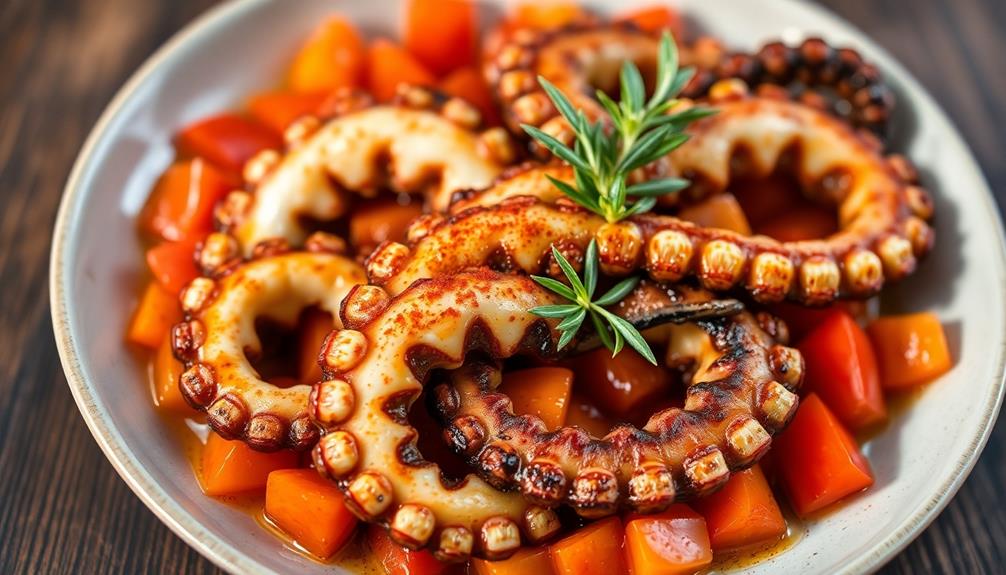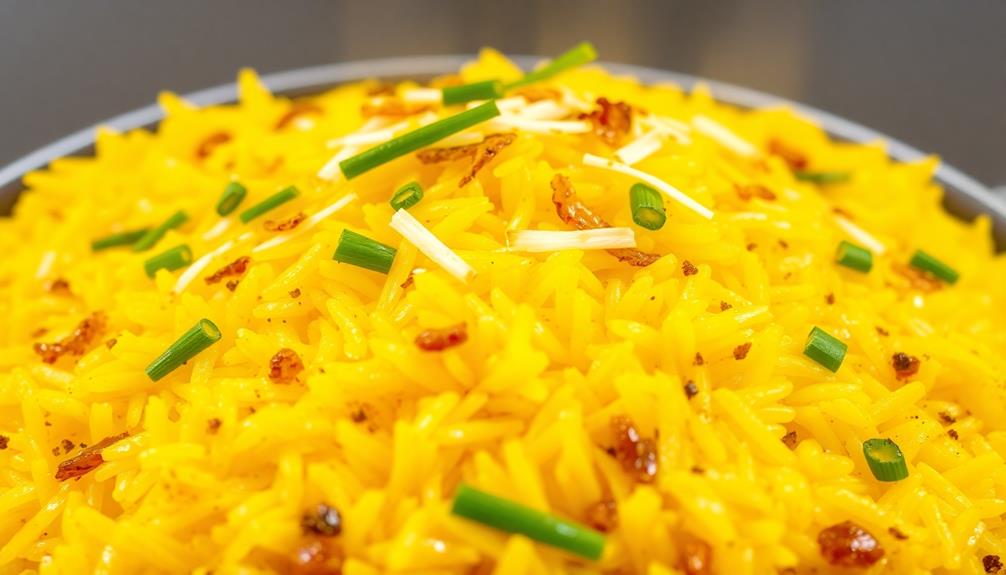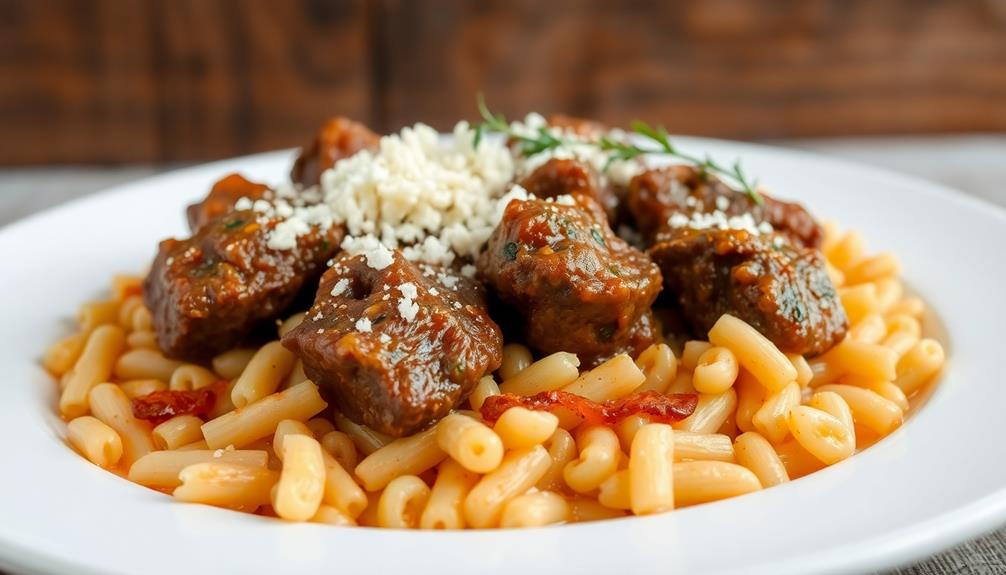Octopus, whether grilled to perfection or elegantly dressed in a vibrant vinaigrette, is a captivating culinary delight that has enchanted palates for centuries across the Mediterranean and beyond. With a unique texture that's both firm and tender, octopus's subtle sweetness pairs beautifully with zesty lemon and an array of seasonings. Whether you prefer the smoky char of the grill or the cool refreshment of a chilled vinaigrette, this versatile seafood offers endless opportunities to explore new flavors and techniques. So get ready to embark on a flavorful journey, as there's much more to discover about the wonders of octopus.
Key Takeaways
- Properly selecting and preparing fresh octopus is essential for achieving the desired texture and flavor.
- Grilling octopus over medium-high heat results in a delightful golden-brown crust and tender interior.
- Creating a vinaigrette dressing allows for serving octopus as a chilled appetizer, perfect for summer gatherings.
- Octopus possesses a unique, subtly sweet flavor that pairs well with various ingredients and cuisines.
- Patience and proper cooking techniques are crucial for tenderizing octopus and developing its complex flavor profile.
History
The origins of octopus preparation can be traced back to ancient Greek and Roman civilizations, where the creature was prized for its unique flavor and tender texture.
Back then, people would catch octopuses, clean them thoroughly, and then cook them in a variety of ways, such as boiling, grilling, or even pickling them in vinegar.
Over the centuries, these traditional methods of octopus preparation have been passed down through generations, evolving and adapting to different regional cuisines and personal preferences.
Today, octopus remains a beloved ingredient in many Mediterranean and Asian dishes, showcasing its versatility and the rich history behind its culinary importance.
Whether you're enjoying a classic grilled octopus or a tangy vinaigrette, you're partaking in a culinary tradition that's been savored for millennia.
Recipe
Octopus is a deliciously versatile seafood that can be prepared in a variety of ways. When properly cooked, it offers a tender, slightly chewy texture and a delicate, briny flavor. This recipe will guide you through the process of preparing a perfectly cooked octopus dish.
Selecting the right octopus is crucial. Look for a fresh, firm specimen with a vibrant color. Avoid any that appear discolored or have a strong fishy odor, as these may not be as fresh. It's also important to properly clean and tenderize the octopus before cooking to ensure a pleasant dining experience.
Ingredients:
- 1 lb fresh octopus, cleaned and tenderized
- 2 tablespoons olive oil
- 1 onion, diced
- 3 cloves garlic, minced
- 1 cup dry white wine
- 1 cup diced tomatoes
- 1 teaspoon paprika
- Salt and pepper to taste
Cooking Instructions:
In a large, heavy-bottomed pot or Dutch oven, heat the olive oil over medium-high heat. Add the diced onion and sauté until translucent, about 5 minutes. Stir in the minced garlic and cook for an additional minute, until fragrant.
Pour in the white wine and allow it to simmer for 2-3 minutes, scraping up any browned bits from the bottom of the pot. Add the diced tomatoes, paprika, salt, and pepper.
Gently place the cleaned and tenderized octopus into the pot, ensuring it's submerged in the liquid. Bring the mixture to a boil, then reduce the heat to low, cover, and simmer for 45-60 minutes, or until the octopus is tender and cooked through.
When cooking octopus, it's important to be patient and allow the slow simmering process to tenderize the meat. Avoid overcooking, as this can result in a rubbery texture.
Serve the octopus immediately, garnished with fresh herbs or a drizzle of olive oil, if desired. Enjoy this flavorful and tender seafood dish with crusty bread or a side of roasted vegetables. If you’re looking for other ways to enjoy delicious seafood, consider trying a fried squid recipe. The crispy texture and savory flavor of fried squid make it a popular dish in many cultures. Whether you’re serving octopus or fried squid, both dishes are sure to be a hit at your next dinner party or family gathering. So, get creative in the kitchen and explore the world of seafood with these tasty recipes.
Cooking Steps
First, rinse the octopus under cold water to clean it.
Then, tenderize the octopus by gently pounding it – this will help break down the tough texture.
Next, marinate the octopus in red wine to infuse it with flavor.
Step 1. Rinse Octopus Under Cold Water
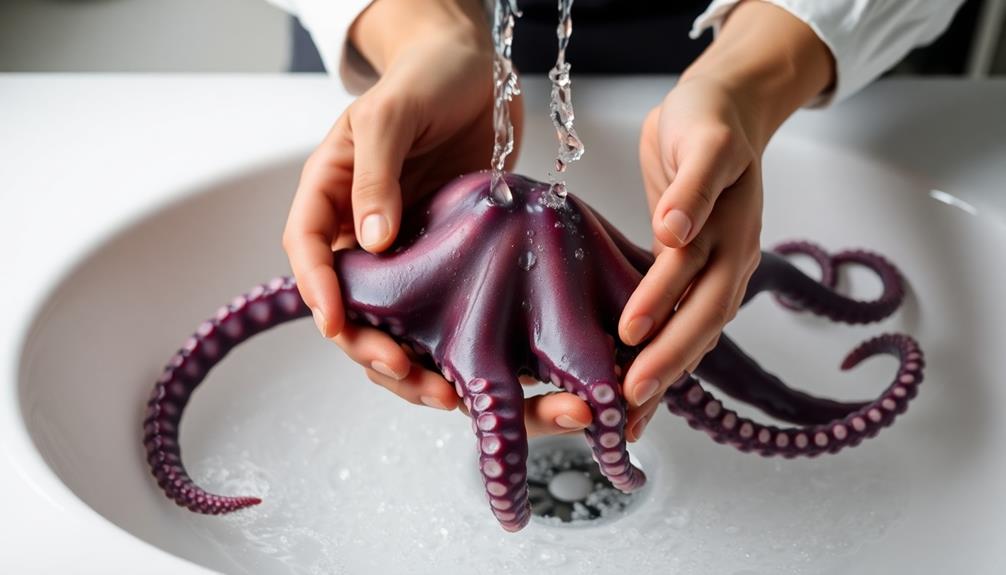
Begin by rinsing the octopus thoroughly under cold running water. This crucial step helps remove any impurities or debris that may have accumulated on the delicate tentacles.
As the water cascades over the octopus, you'll notice the vibrant colors come to life, hinting at the delicious meal to come. Gently use your hands to massage the octopus, ensuring every inch is cleaned.
Pay special attention to the suckers, gently scrubbing away any stubborn particles. The cold water will also help to firm up the texture of the octopus, making it easier to handle and prepare.
Once the octopus is clean, pat it dry with paper towels or a clean cloth. This drying step is important, as it will help the octopus sear and caramelize when you begin the cooking process.
With the octopus rinsed and dried, you're now ready to move on to the next step in your culinary adventure.
Step 2. Tenderize Octopus by Pounding Gently
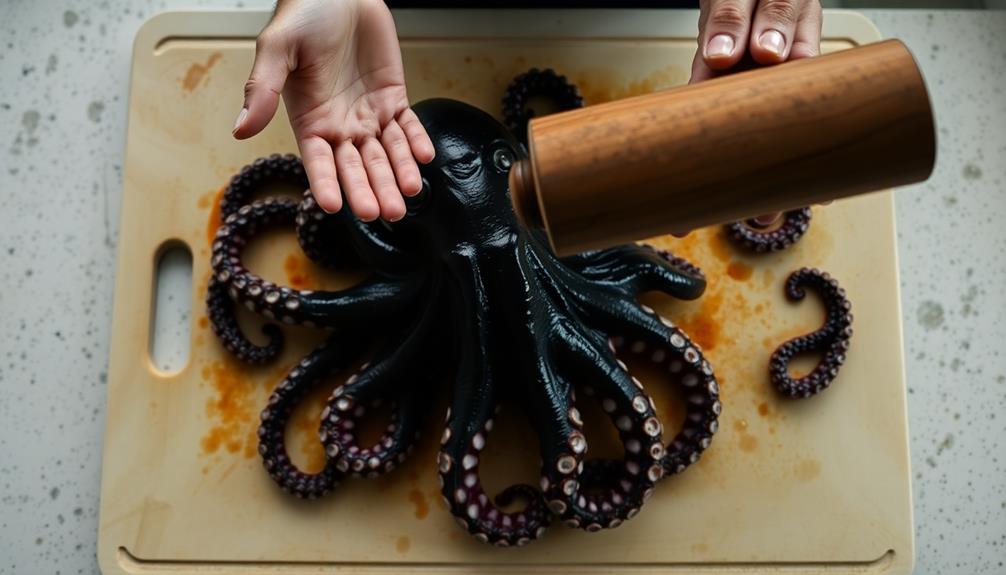
The next step is to tenderize the octopus by gently pounding it.
Grab a sturdy cutting board and a meat mallet or the back of a heavy pan. Carefully place the octopus on the board, making sure it's lying flat. Gently tap the surface of the octopus, applying even pressure across the entire body.
Don't pound too hard – you want to tenderize the meat, not flatten it. Go slowly, taking your time to ensure the entire octopus is evenly tenderized. This step helps break down the tough connective tissues, making the octopus more tender and easier to chew.
Once you've pounded the entire octopus, flip it over and repeat the process on the other side. Remember to be gentle, as you don't want to damage the delicate texture.
With the octopus tenderized, you're ready to move on to the next step in preparing this delicious seafood.
Step 3. Marinate Octopus in Red Wine
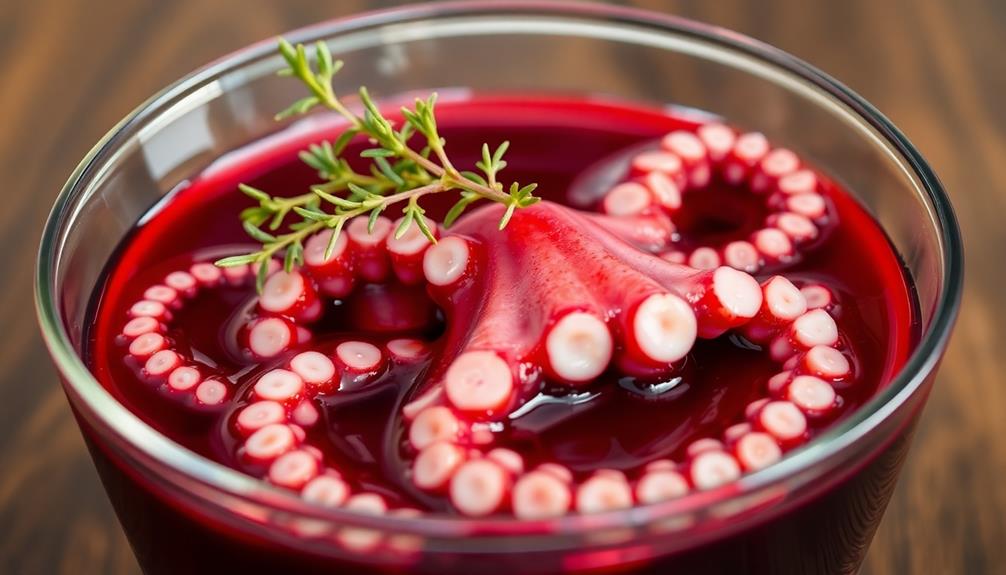
With the octopus tenderized, it's time to impart some robust flavor by marinating it in red wine. This simple yet effective technique will transform the texture and taste of your octopus, making it even more tender and infusing it with a deep, rich aroma.
Start by choosing a full-bodied red wine – something like a Merlot or Cabernet Sauvignon will work beautifully.
Gently place the pounded octopus into a resealable plastic bag or nonreactive container. Pour the red wine over the top, making sure the octopus is fully submerged. Seal the bag or cover the container and let it marinate in the refrigerator for at least 2 hours, or up to 6 hours for maximum flavor.
As the octopus marinates, the wine will slowly penetrate the flesh, breaking down the proteins and tenderizing the meat. The robust, fruity notes of the wine will also infuse the octopus, creating a complex and delicious flavor profile.
When you're ready to cook, simply remove the octopus from the marinade and proceed with your desired recipe.
Step 4. Grill Octopus Over Medium-High Heat

Grilling the octopus over medium-high heat brings out its natural sweetness and creates a delightful charred exterior.
Start by patting the octopus dry with paper towels, ensuring the tentacles are separated and laid flat. Brush a light coat of olive oil over the octopus, then season it generously with salt and pepper.
Now, place the octopus on a grill preheated to medium-high heat. Grill for about 3-4 minutes per side, flipping carefully with tongs to avoid breaking the tentacles. You'll know it's ready when the octopus develops a beautiful golden-brown crust and the tentacles curl up slightly.
Be sure to keep a close eye, as octopus can overcook quickly.
Once grilled to perfection, transfer the octopus to a cutting board and let it rest for a minute or two. This allows the juices to redistribute, resulting in a tender, flavorful dish.
Slice the octopus into bite-sized pieces and serve immediately, either on its own or paired with your favorite accompaniments.
Step 5. Serve With Lemon Wedges

Serve the grilled octopus with a few lemon wedges on the side. These bright, juicy citrus slices will complement the savory, charred flavor of the octopus perfectly. Squeeze a bit of lemon juice over the tender, succulent tentacles just before taking your first bite. The acidic tang will help cut through the richness, refreshing your palate with each mouthful.
Don't be shy – use your fingers to pick up the octopus and dip it into the lemon juice. The combination of textures, with the soft, springy flesh and the bright, zippy lemon, is utterly delightful.
You can also offer small lemon wedges on the side, allowing your dinner guests to season their portions to their liking. The vibrant yellow color of the lemon slices will also make for an attractive presentation, adding a beautiful pop of color to the plate.
Savor every flavorful bite, enjoying the harmony of the grilled octopus and zesty lemon.
Final Thoughts
Preparing octopus may seem daunting, but with the right techniques, you can elevate this seafood delicacy. Whether you choose to grill it or prepare it in a classic vinaigrette, the end result will be a dish that will impress your guests and satisfy your taste buds.
The key to success is to treat the octopus with care and patience. Take the time to properly clean and tenderize the meat, allowing the flavors to fully develop.
Don't be afraid to experiment with different marinades and seasonings to find the perfect balance that suits your personal preferences.
As you savor each bite, you'll be reminded of the unique texture and subtle sweetness of the octopus. This versatile ingredient can be paired with a variety of sides, from crisp salads to roasted vegetables, making it a wonderful addition to any meal.
Embrace the adventure of preparing octopus and let your culinary creativity shine. With a little practice, you'll be whipping up octopus dishes that will have your family and friends raving.
Frequently Asked Questions
How Do I Know if the Octopus Is Fresh?
To know if octopus is fresh, look for a firm, moist texture. The color should be vibrant, not dull or discolored. Avoid any fishy odor – it should have a clean, briny aroma. Trust your senses and choose the freshest octopus available.
What Is the Best Way to Tenderize Octopus?
To tenderize octopus, you can pound it with a mallet or use a meat tenderizer. Alternatively, you can simmer it in water or broth for about an hour until it's tender and easy to slice.
Can I Substitute Other Seafood for Octopus?
You can absolutely substitute other seafood for octopus. Squid, calamari, or even shrimp would work well. Just be mindful of cooking times, as different types of seafood have varying levels of toughness and require different preparation methods.
How Long Can I Store Cooked Octopus?
You can typically store cooked octopus in the refrigerator for 3-4 days. Make sure to keep it in an airtight container and consume it within that timeframe for the best quality and safety.
Is There a Vegetarian Alternative to Octopus?
You could try using portobello mushroom caps as a vegetarian alternative to octopus. They've got a similar texture and can be grilled or marinated in a vinaigrette for a similar taste.
